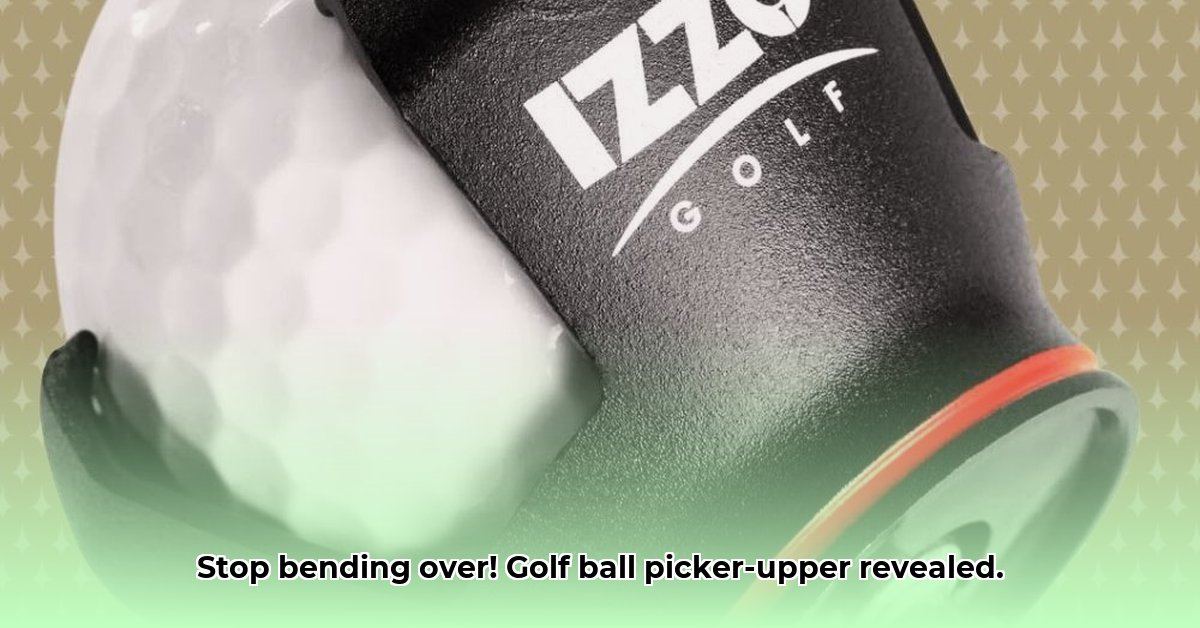Tired of bending over to pick up golf balls, leaving you with a sore back and wasted time? Picking up golf balls shouldn’t feel like a workout! This guide will help you find the perfect golf ball picker-upper to save your back and get you back to the game faster. We’ll review different types – from easy-to-use handheld models to powerful high-capacity retrievers – comparing features, pros, and cons to help you choose the best one for your needs and budget. Whether you’re a casual golfer or a driving range manager, we’ll walk you through everything you need to know to make the best choice and say goodbye to backaches and wasted time on the course.
Golf Ball Picker Uppers: Reclaim Your Game and Your Back!
Let’s face it: bending over repeatedly to pick up golf balls isn’t just tedious, it’s a recipe for backaches and wasted time. That’s where a golf ball picker upper comes in—a handy tool that makes retrieving those stray balls a breeze. But with so many options, how do you choose the right one? Let’s break it down to find the perfect fit for you and improve your golf game.
Understanding Your Options: The Core Designs
Forget about back-breaking stoops! Golf ball retrievers come in three main designs, each with unique strengths and weaknesses:
-
Suction Cup Pickers: The simplest and most common type. A suction cup on a stick. Easy to use, lightweight, and affordable, ideal for quick retrievals on smoother surfaces.
Pros: User-friendly, lightweight, inexpensive, great for quick pickups.
Cons: Unreliable suction on wet or uneven ground. May damage soft balls. Not designed for collecting multiple balls. -
Prong-Style Pickers: These use grasping claws or prongs to grab balls. More durable and better suited for varied terrains and wet conditions.
Pros: Versatile terrain handling, reliable in wet conditions, gently secures balls.
Cons: Slightly heavier than suction cup models. -
Rolling Collection Models: Designed for efficiently collecting multiple balls at once. Ideal for driving ranges or courses.
Pros: Exceptional capacity for high-volume ball collection.
Cons: Limited maneuverability. Not ideal for single ball retrieval from difficult areas.
Choosing the Right Golf Ball Retriever: Matching Tool to Task
Consider your typical golfing habits. Do you need to collect a few balls after a round, or retrieve hundreds from a driving range?
-
Handheld Golf Ball Pickers: Lightweight, portable, and ideal for quickly retrieving a few balls.
-
High-Capacity Golf Ball Retrievers: Designed for collecting dozens or hundreds of golf balls. Essential for ranges or course maintenance crews.
Your Golf Ball Retriever Buying Guide: A Step-by-Step Strategy
Choosing a golf ball picker upper doesn’t have to be complicated. Here’s a streamlined guide to help you make the right decision:
Step 1: Evaluate Your Needs: How often will you use it? How many balls do you typically collect? What type of terrain do you usually play on?
Step 2: Define Your Budget: Prices range from inexpensive handheld models to costly high-capacity collectors.
Step 3: Choose Your Retrieval Method: Based on Step 1, determine if a suction cup, prong, or collection tube is best suited for your needs. Consider terrain (wet, dry, bumpy, smooth).
Step 4: Explore Reviews: Look for user feedback. Real-world experiences reveal strengths and weaknesses that you might not find in a product description.
Step 5: Compare Products: Examine the features and specifications, comparing several models side-by-side. Focus on weight, material durability, and construction quality.
Step 6: Make Your Purchase: Armed with your research, you’re ready to pick the golf ball picker upper that best suits your needs.
Step 7: Enjoy a More Comfortable Game: You’ve earned it!
Here’s a comparison at a glance:
| Feature | Handheld Suction Cup | Handheld Prong | Rolling Collection Model |
|---|---|---|---|
| Price Range | $10 – $30 | $15 – $40 | $50 – $200+ |
| Ball Capacity | 1-3 | 1-3 | 50+ |
| Weight | Lightweight | Moderate | Heavy |
| Ideal Terrain | Smooth | Most | Relatively flat |
| Ideal User | Casual golfer | Most golfers | Golf courses/driving ranges |
A good golf ball picker upper isn’t just about convenience; it’s about protecting your back. Choose wisely, and happy golfing!
Selecting the Right Golf Ball Picker Upper for Driving Ranges
If you’re in charge of maintaining a driving range and looking to improve golf ball retrieval efficiency, here’s a detailed guide:
Key Points:
- Golf ball pickers significantly reduce time and physical strain.
- Consider different retrieval methods: suction, prongs, and rolling collection.
- Capacity is crucial; evaluate based on range size and ball volume.
- Materials impact durability (steel, aluminum, nylon).
- User reviews provide practical insights.
Diving Deeper: Types of Golf Ball Retrievers
Picking up golf balls manually is time-consuming. A quality picker-upper simplifies the task. How do you choose? Consider the options.
Suction Cup Pickers: Compact and typically handheld. Best for smaller ranges or individual use.
- Pros: Budget-friendly, lightweight, and easy to carry.
- Cons: Limited capacity and less effective on uneven or wet surfaces.
Prong-Style Pickers: Tongs or claws for gripping balls. Suitable for various terrains.
- Pros: Secure grip, performs well on different surfaces, good capacity.
- Cons: Can be heavier than suction models.
Rolling Collection Models: High-capacity. Designed for extensive ball collection needs.
- Pros: High ball capacity, efficient for large-scale retrieval.
- Cons: Higher cost, less maneuverable.
Capacity: Matching Your Retrieval Needs
The picker’s holding capacity is critical, especially for driving ranges. A high-capacity model is much more efficient if you have a large driving range. How many balls do you collect daily? This will influence your choice.
Material Matters: Prioritizing Durability
The material of the golf ball picker significantly impacts its longevity. Galvanized or electroplated steel provides excellent durability but adds to the cost. Aluminum and nylon might be lighter but less durable with heavy use.
Navigating Your Purchase: A Step-by-Step Guide
- Analyze your needs: How many balls should you collect daily? What’s your budget? What type of terrain are you working on?
- Investigate different types: Read reviews of suction cup, prong, and rolling collection models.
- Assess features: Capacity, weight, materials, and ease of use.
- Evaluate user reviews: Discover what other owners say about each model.
- Decide: Choose a golf ball picker upper that meets your requirements and budget.
Golf Ball Picker-Upper Comparison
| Feature | Handheld Suction Cup | Handheld Prong | Rolling Collection Model |
|---|---|---|---|
| Price Point | Low | Moderate | High |
| Capacity | Very Low | Low | Very High |
| Terrain Suitability | Smooth, Dry | Variable | Flat, Even |
| Durability | Low | Moderate | High |
| Ideal For | Casual Use, Small Areas | General Use | Large Ranges |
- Discover whirlwind golf club: arizona’s hidden gem near phoenix - February 23, 2026
- Discover Water’s Edge Golf Club: Chicago’s South Side Hidden Gem - February 21, 2026
- Warrior Golf Club Review: Five Stars & Premier Semi-Private Experience - February 19, 2026










